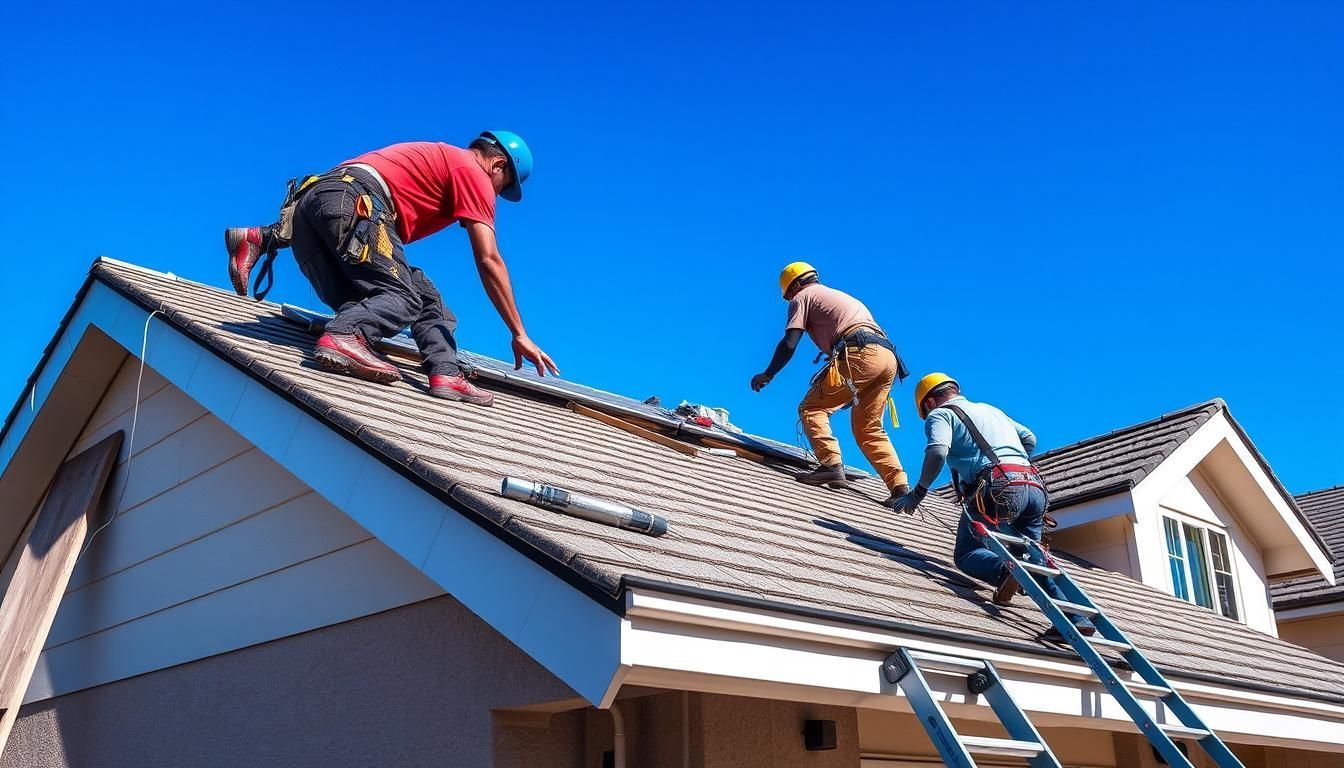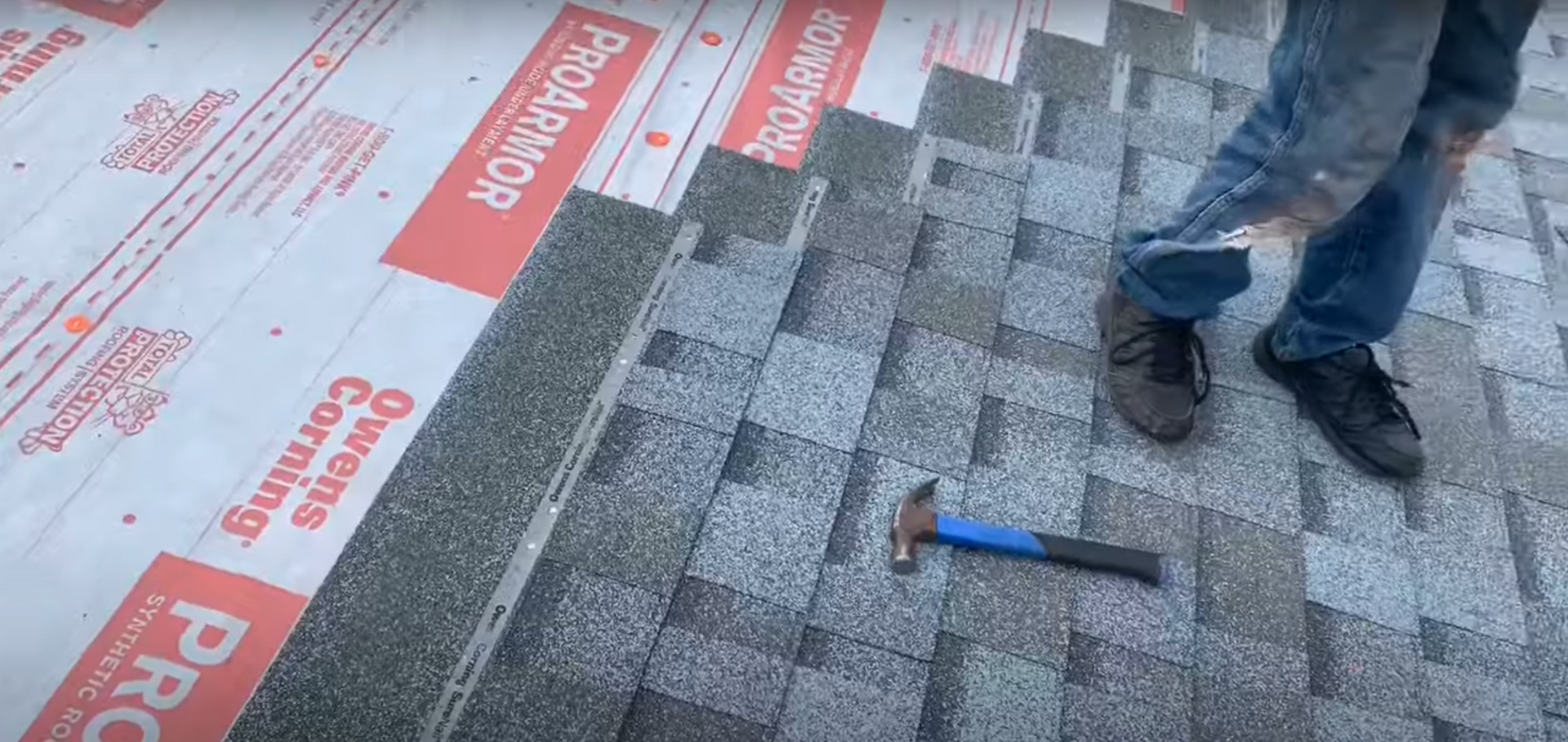Roof Installation in Los Altos, CA
A sturdy roof is the crown of your home. Professional roof installation by licensed roofers ensures your house stays protected for years to come. These experts bring skill, knowledge, and top-notch materials to every job.
Certified roofers understand the ins and outs of roof installation. They can handle various roofing types, from classic shingles to modern metal systems. Their expertise not only boosts your home's safety but also its value.
When you choose skilled roofers, you're investing in peace of mind. They follow strict safety rules and use the best tools for the job. This means a roof that lasts longer and performs better, saving you money in the long run.
Key Takeaways
- Licensed roofers provide expert roof installation services
- Professional installation enhances home protection and value
- Certified roofers can handle various roofing types
- Expert installation leads to longer-lasting roofs
- Choosing skilled roofers ensures safety and quality


We will get back to you as soon as possible
Please try again later
Understanding Roof Installation Types
Choosing the right roof for your home is a big decision. Different materials offer unique benefits and suit various architectural styles. Let's explore some popular roofing options to help you make an informed choice.
Asphalt Shingle Roofs
Asphalt shingles are a common choice for many homeowners. They're affordable, easy to install, and come in various colors. These roofs typically last 20-30 years with proper maintenance.
Metal Roof Systems
Metal roofs are gaining popularity due to their durability and energy efficiency. Metal roof installers can create sleek, modern designs that last up to 50 years. Many metal roofers offer options like steel, aluminum, or copper to suit different budgets and styles.
Tile Roof Options
Tile roofs add a classic, elegant look to homes. They're fire-resistant and can last over 50 years. While more expensive upfront, their longevity makes them cost-effective in the long run.
For flat or low-slope roofs, flat roofers often recommend materials like TPO or EPDM. These options provide excellent waterproofing for commercial and some residential buildings.
When selecting a roof type, consider your climate, budget, and home's style. Consulting with experienced roofers can help you make the best choice for your specific needs.
The Importance of Quality Materials
Using top-notch materials is key for roof installation. The best roofers know that a roof's durability and performance depend on material quality. Let's look at how to pick the right materials and why premium products are worth it.
Selecting the Right Roofing Materials
Choosing the right materials for your roof is crucial. Consider climate, budget, and style when making a decision. Popular options include:
- Asphalt shingles
- Metal roofing
- Clay or concrete tiles
- Slate
Benefits of Using High-Quality Materials
Investing in superior roofing materials pays off in the long run. The best roofers highlight these benefits:
- Increased lifespan of your roof
- Better resistance to weather elements
- Improved energy efficiency
- Enhanced curb appeal
Quality materials also need less maintenance, saving you money over time. Remember, a roof is a long-term investment. Choosing the right materials is key for lasting protection and value.
Steps in the Roof Installation Process
A successful roof installation needs careful planning and execution. Professional roof installers use a systematic approach. This ensures your new roof is both durable and efficient. Let's look at the main steps in this process.
Initial Roof Inspection
The first step is a detailed inspection of your current roof. Experienced roof installers check the roof's condition and find any issues. They then plan the best action for your specific needs.
Preparing the Roof Deck
After the inspection, the team gets the roof deck ready. They remove old shingles and fix damaged areas. They make sure the surface is clean and stable. This step is key for your new roof's long life.
Installing the Chosen Roofing Material
With the deck prepared, roof installers start putting on the new roofing material. The type of roof you choose affects the installation process. Whether it's shingles, metal, or tiles, experts ensure it's installed right for the best performance.
At this point, you might want to add features like a skylight installation. Many roof installers can do this, adding natural light to your home. The process ends with a final check to ensure quality and follow local building codes.
Signs You Need a Roof Installation
Age of Your Roof
How old your roof is matters a lot. Asphalt shingle roofs usually last 20-30 years. If yours is getting close to that age, it's time to think about a new one. Metal roofs can last longer, but they need checks too.
Visible Damage Indicators
Watch out for these roof damage signs:
- Curling or missing shingles
- Daylight through roof boards
- Sagging roof deck
- Granules in the gutters
Energy Efficiency Concerns
An old or damaged roof can make your home use more energy. If your heating or cooling bills go up, your roof might be the reason. Bad insulation or ventilation can let heat in or out.
Don't forget about your rain gutter system. It's part of your roof's health. Good gutters prevent water damage to your roof and foundation. Regular checks by gutter installers can spot problems early.
Benefits of Professional Roof Installation
A new roof is more than just a cover for your home. It's an investment in your property's future. Professional roof installation brings many benefits beyond just keeping the rain out.
Enhanced Longevity
Expert roofers make sure your new roof lasts a long time. They use the right methods and top-notch materials. This means your home gets a strong defense against the weather.
With their care, you'll need fewer repairs and replacements. Many gutter companies also offer roof installation. They give you a complete solution for your home's outside.
Improved Home Value
A roof installed by pros can really increase your home's value. It's a big selling point for buyers, showing your home is well-kept. It also makes your home look better, standing out in the neighborhood.
Think about adding gutter guards to your new roof. Even though gutter guard cost might seem high, it's worth it. These systems stop clogs, cutting down on upkeep and making your roof and gutters last longer. A well-protected home is a valuable home.
- Proper installation techniques
- Use of premium materials
- Comprehensive exterior protection
- Increased property value
- Enhanced curb appeal
Choosing the Right Roofing Contractor
Finding the best roofers is key. A good contractor can mean a roof that lasts or one that needs fixes later.
Questions to Ask Potential Contractors
When talking to roofers, ask about their experience and insurance. Find out about their warranty and how they plan to finish the job. Also, ask for a detailed estimate in writing. These questions show if they know their stuff and are professional.
Importance of Reviews and References
Look up online reviews and ask for references. This shows how well they work and treat customers. Good roofers have happy customers ready to talk about their work. A good contractor will happily give you references.
By doing your homework and asking the right questions, you'll find a reliable roofer. This careful choice means your roof will be in good hands. You'll have peace of mind for many years.
FAQ
How long does a typical roof installation take?
Roof installation time varies. A standard roof takes 2-3 days. But, bigger homes or complex roofs might need a week or more. Weather can also affect the time.
What should I expect during the roof installation process?
Expect noise and activity. Roofers will protect your yard and remove the old roof. They'll check and fix the roof deck and install the new roof. They'll clean up after finishing.
How do I choose the right roofing contractor?
Look for licensed roofers with good reviews. Check their experience, insurance, and warranties. Get detailed quotes and compare them. Ask about their process and timeline.
What are the signs that I need a new roof?
Look for curling, cracking, or missing shingles. Excessive granules in gutters are a sign too. Daylight through your roof, a sagging roof deck, and water stains are also signs. Most asphalt shingle roofs last 20-30 years.
How much does a new roof installation cost?
Costs vary by roof size, materials, and location. Asphalt shingle roofs cost $5,000 to $15,000. Metal roofs can cost $10,000 to $20,000 or more.
Can I install a new roof over my existing one?
Installing a new roof over an old one is sometimes possible. But, roofers usually remove the old roof to check the decking. This ensures a solid base for the new roof.
What type of roofing material is best for my home?
The best material depends on climate, budget, and preferences. Asphalt shingles are affordable and versatile. Metal roofs are durable and energy-efficient. Tile roofs offer a unique look and long life. Talk to roofers to find the best fit for you.
Do I need to replace my gutters when getting a new roof?
You might not need to replace your gutters, but it's a good time to think about it. Gutters can be checked and possibly reattached if they're in good shape. But, if they're old or damaged, replacing them with your roof can save money in the long run.
What kind of warranty can I expect with a new roof installation?
You'll get two warranties: one for the materials and one for the work. Material warranties last 20-50 years. Roofers offer workmanship warranties of 5-10 years or more, covering installation issues.
Can I install solar panels or skylights during my roof installation?
Yes, installing solar panels or skylights during roof installation is a good idea. Many roofers offer these services. It's more efficient and cost-effective to do it during the roofing process. Talk to your contractor about these options early on.
GET YOUR FREE ROOFING ESTIMATE TODAY!
QUICK LINKS
COMPANY INFO
